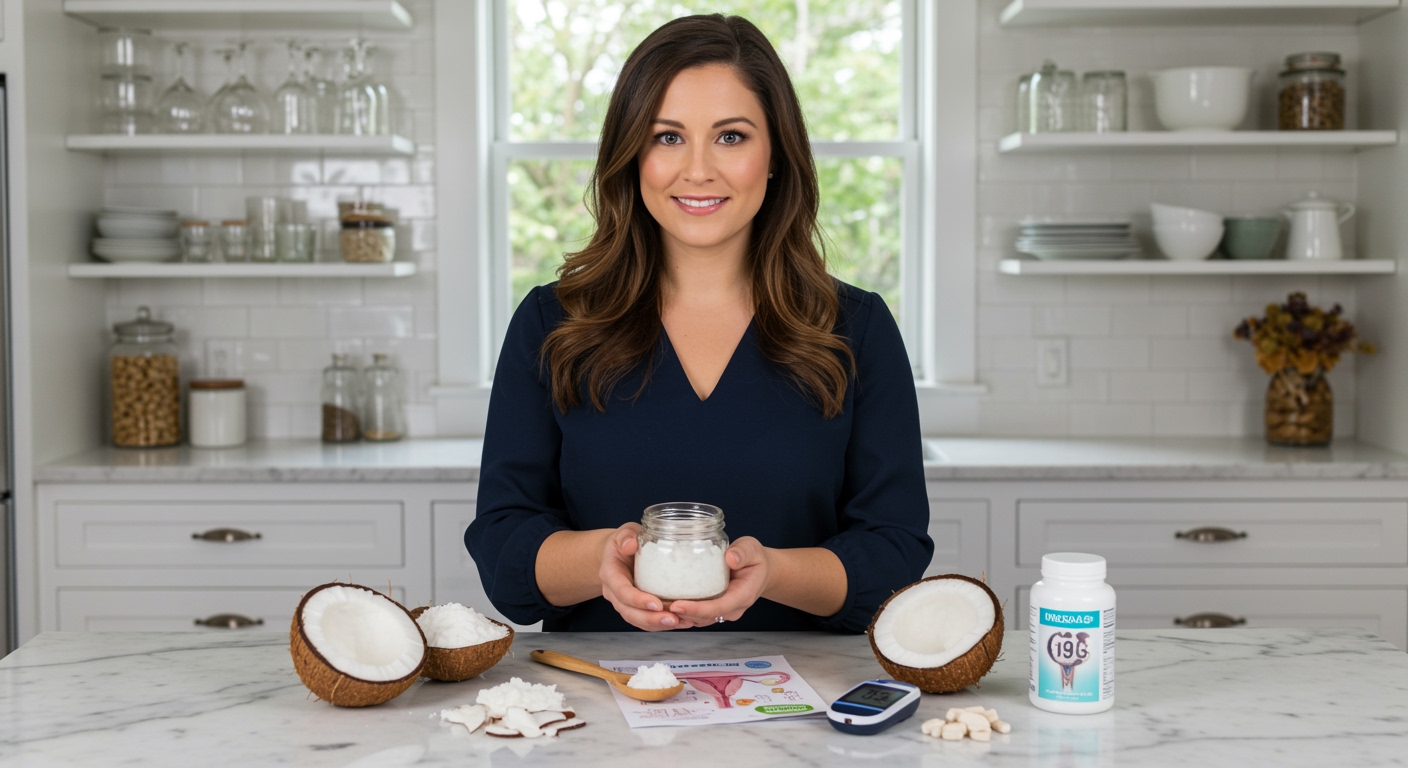✪ Key Takeaway: Coconut oil can be beneficial for PCOS when used in moderation due to its medium-chain fatty acids that may improve insulin sensitivity.
Introduction
Coconut oil sits in your kitchen cabinet like a controversial guest at a dinner party.
You might be asking this question because conflicting information about coconut oil and PCOS floods the internet every day.
Hi, I am Abdur, your nutrition coach and today I am going to explain exactly how coconut oil affects women with PCOS and whether you should include it in your diet.
What Makes Coconut Oil Different From Other Fats?
Coconut oil contains about 90 percent saturated fat, which sounds alarming at first glance.
However, roughly 60 percent of these fats are medium-chain triglycerides or MCTs.
MCTs behave completely differently in your body compared to long-chain fatty acids found in most other oils.
Your liver processes MCTs directly and converts them into ketones for immediate energy.
This unique metabolic pathway means coconut oil does not get stored as body fat as easily as other saturated fats.
✪ Fact: Lauric acid makes up about 50 percent of coconut oil and has antimicrobial properties that support gut health.
How Does Coconut Oil Affect Insulin Resistance in PCOS?
Insulin resistance affects up to 70 percent of women with PCOS and drives many symptoms.
Research shows that MCTs in coconut oil may improve insulin sensitivity better than long-chain fatty acids.
A study on rats with PCOS-like symptoms found that virgin coconut oil helped reduce insulin resistance markers.
The ketones produced from MCTs can provide an alternative fuel source for your cells when glucose metabolism is impaired.
This metabolic flexibility may help reduce the burden on your insulin system.
However, coconut oil still contains calories and should replace other fats rather than add extra calories to your diet.
✪ Pro Tip: Use coconut oil for cooking at high temperatures since it has a high smoke point and remains stable.
Can Coconut Oil Help With PCOS Weight Management?
Weight management becomes challenging for many women with PCOS due to hormonal imbalances and insulin resistance.
MCTs in coconut oil require more energy to digest and metabolize than other types of fats.
This process, called the thermic effect of food, can slightly increase your metabolic rate.
Some studies suggest that MCTs may help reduce abdominal fat storage, which is particularly problematic in PCOS.
The satiety effect of coconut oil may also help you feel full longer and reduce overall calorie intake.
Remember that coconut oil contains about 120 calories per tablespoon, so portion control remains essential.
✪ Note: Start with one teaspoon daily and gradually increase to avoid digestive upset from too much MCT at once.
What About Coconut Oil and Cholesterol Concerns?
The high saturated fat content in coconut oil raises legitimate concerns about cardiovascular health.
Women with PCOS already face increased risk of heart disease and metabolic syndrome.
However, recent research suggests that lauric acid in coconut oil may raise both good and bad cholesterol levels.
The net effect on your cholesterol ratio might be neutral or even slightly positive.
Still, if you have existing heart disease or high cholesterol, consult your doctor before adding coconut oil to your diet.
Monitor your lipid panels regularly if you decide to use coconut oil consistently.
✪ Fact: Virgin coconut oil contains more beneficial compounds than refined versions, so choose unrefined options when possible.
How Much Coconut Oil Should Women With PCOS Use?
Moderation becomes the key word when incorporating coconut oil into a PCOS-friendly diet.
Start with one teaspoon daily and observe how your body responds over several weeks.
You can gradually increase to one to two tablespoons per day if you tolerate it well.
Replace other cooking oils rather than adding coconut oil as extra calories to your diet.
Use it for sautéing vegetables, in smoothies, or as a butter substitute in baking.
Track your symptoms, weight, and energy levels to determine if coconut oil benefits your individual PCOS management.
✪ Pro Tip: Combine coconut oil with anti-inflammatory foods like turmeric and ginger for enhanced PCOS benefits.
The Bottom Line
Coconut oil can be a beneficial addition to a PCOS diet when used mindfully and in appropriate amounts.
The best diet is not about perfection but about making informed choices that support your unique health needs.
I would love to hear about your experience with coconut oil and PCOS in the comments below, or feel free to ask any questions you might have.
References
At NutritionCrown, we use quality and credible sources to ensure our content is accurate and trustworthy. Below are the sources referenced in creating this article:
- The PCOS Dietitian: Coconut Oil and PCOS
- Medical News Today: Coconut Oil: Health Benefits and Risks
- PMC: Virgin Coconut Oil and PCOS Research
- NeuroQuantology: Beneficial Effect of Virgin Coconut Oil in PCOS





